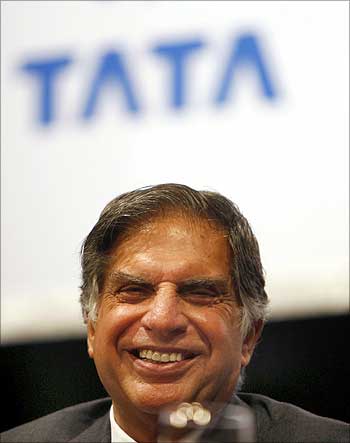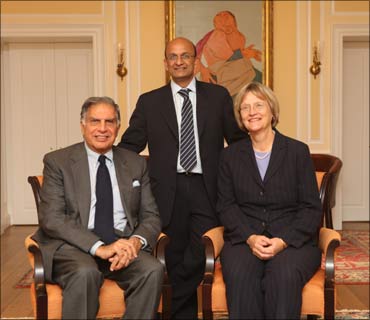
The Tata Group is investing millions of dollars in Sun Catalytix -- an energy storage and renewable fuels company -- founded by a Massachusetts Institute of Technology professor, Daniel Nocera.
The aim is to introduce a low-cost solar contraption to power homes for the poor, primarily in developing countries like India.
The Tata group is well known for its bias towards low-cost innovations like the Nano car and Swach water filter.
Sun Catalytix's prototype can split hydrogen from any source of water, be it river water, sea water or even human waste.
Once the water molecules are split into hydrogen and oxygen, the hydrogen powers fuel cells. Built at a cost of around $20 (around Rs 920), it is expected to hit the market in 18 months.
. . .

"We have the capability to power a household with just two bottles of water from any source," claims Nocera, who is also director of MIT's Solar Revolutions Project and the ENI Solar Frontiers Centre.
The reasoning is simple. Solar power, up until now, has been a daytime-only energy source. But storing extra solar energy for use when the sun sets is expensive.
Sun Catalytix also believes batteries have a limitation when it comes to storing electrical energy. The company's prototype, hence, has taken a cue from nature -- the process of photosynthesis -- whereby plants and bacteria use energy from sunlight to produce sugar, which cellular respiration converts into adenosine tri-phosphate, or ATP, the 'fuel' used by all living things.
It was around two years ago that Nocera and Matthew Kanan, a post-doctoral fellow in Nocera's lab, had announced the details of the experiment. They have since refined it further.
. . .

"By eliminating expensive precious metals and substantially reducing costs, our technology promises to enable the conversion of electrical, solar or wind energy into storable energy at low cost," says Nocera.
The contraption, according to Prof Nocera, has advantages over current electrolysers, which split water with electricity and are often used for industrial purposes.
But they are not suited for artificial photosynthesis because they are very expensive (around $12,000 per Kw) "and require a highly basic (non-benign) environment that has little to do with the conditions under which photosynthesis operates".
Tata Sons Chairman Ratan Tata is understood to be taking a personal interest in the project, while simultaneously providing personnel from his group companies to make this project successful.
. . .

The Tata Group has a joint venture with BP Solar, Tata BP Solar, which is one of the largest solar companies in Asia.
Ralf Speth, CEO of Jaguar Land Rover (a Tata company), is on the board of Sun Catalytix. While the Tata Group has officially pumped $9.5 million into the company, people with knowledge of the development say the investment is much more and that Ratan Tata is a co-owner.
Other investors include Polaris Venture Partners. Amir Nashat is acting CEO of Sun Catalytix.
In July 2009, the government unveiled a $19-billion plan to produce 20 Gw of solar power by 2020, wherein solar-powered equipment and applications would be mandatory in all government buildings, including hospitals and hotels.
. . .

Further, in the 2010-11 Budget, the government had announced an allocation of $227 million towards the Jawaharlal Nehru National Solar Mission and the establishment of a Clean Energy Fund.
Currently, though, solar power is much more expensive than power generated by other sources of energy like wind, coal and water. The government, therefore, has to subsidise solar power.
Meanwhile, other companies like Amyris of the US are also developing genetic-engineering technologies that change the way microbes process sugar, turning them into "biorefineries" that could provide alternatives to products derived from petroleum.